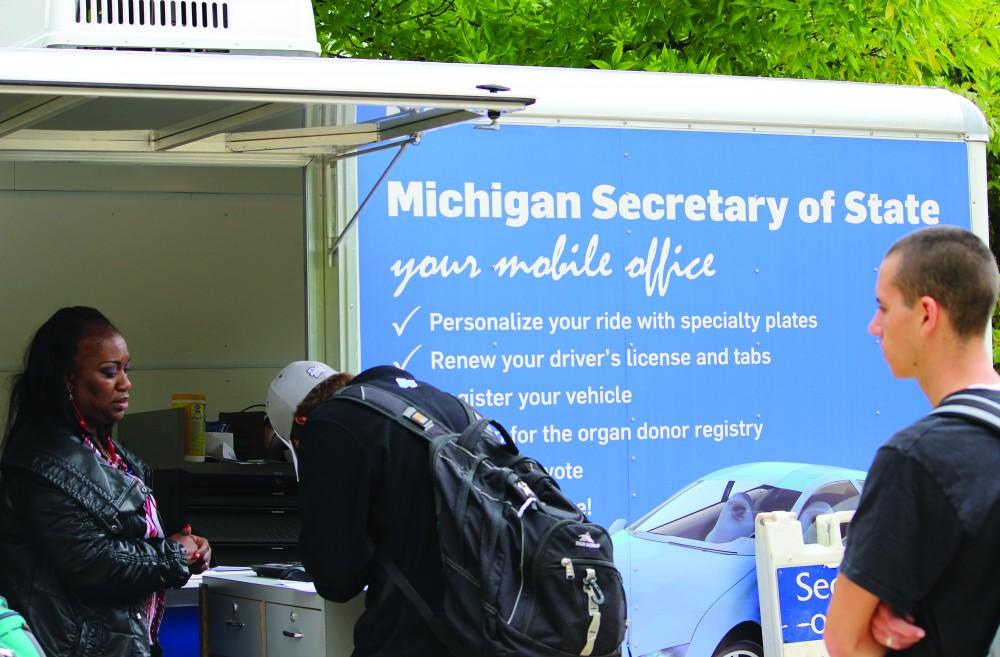Secretary of State gives student voters no excuse not to cast Nov. ballot

GVL / Nate Ritter GVSU students registering to vote for the upcoming election.
Sep 19, 2012
Each day students are told by the media and the people around them that Barack Obama needs the youth vote in order to win the upcoming election. In fact, while visiting Iowa State University a few weeks ago, Obama himself reportedly told the students, “I’m counting on you.” But how much of this message is meant to persuade college-age students to contribute to the future of the U.S., and how much of it is really true? Do college students really hold the reigns in this election?
Donald Zinman, associate professor of political science at Grand Valley State University, confirmed that neither Obama nor the rest of the population is exaggerating — the student vote really is important. “It is, but it’s a lot more effort to get them to vote,” Zinman said. “It requires a lot more heavy lifting, whereas with senior citizens, you can just tell them ‘this is the day of the election,’ and then they show up. There’s not a lot of effort required there to actually get them to vote. With people [ages] 18 to 24, it can be a lot of heavy lifting. ‘Here’s where you go to register, here’s the forms you got to fill out, here’s where the polling place is.’ It’s a lot of work.”
According to the National Center for Education Statistics, about 21.6 million Americans were expected to attend college this fall. This demographic constitutes about 7 percent of the total U.S. population as measured by the 2012 U.S. Census. So appealing to young voters can’t hurt. And in a close race, student votes could be even more crucial, Zinman said.
“If an election is close, any movement in numbers or turnout among any demographic group is enough to sway the outcome of a close election,” he said, adding that the generally light turnout of young voters may be problematic to Obama, who paddles downstream with a typically Democrat student population and received strong support from student voters in 2008. “In states that have important college towns—Charlottesville, Virg., or Ann Arbor, Mich.—swing states that have important college towns, I mean you’ve got to maximize that vote.”
The Secretary of State’s office considers student votes so important that it transports a mobile unit to college campuses statewide to eliminate students’ excuses not to vote. “We’re visiting all the college campuses just so everyone has the chance to have their voice heard,” said Pierre Batton with Michigan’s Secretary of State. “For a lot of students, this is their first election. There is some confusion, questions that need to be answered, or people not being able to get into our office to register to vote. People have busy lives. By coming to them, we remove a lot of those obstacles and give them the opportunity to have their voice heard.”
Batton said he helped a little over 50 students register to vote Tuesday when the mobile unit stopped by GVSU’s Allendale campus. He also answered a number of questions from first-time voters, who were usually confused about the absentee ballot process. “A typical question that we’re getting asked is who’s eligible for an absentee ballot or what are the eligibility requirements for an absentee ballot,” Batton said. “That’s usually the most common question we get at college campuses. Somebody either has to have previously voted in an election—a general election—or they have to have registered to vote in person. So if someone wants to use an absentee ballot and keep the address the same on their license, they need to register in person at a Secretary of State office in order to be eligible for an absentee ballot.”
Students who are not eligible for an absentee ballot and cannot make the trip home to vote also have the option of changing their home address to their local school address. To make an address change students need only stop by the Secretary of State office with a driver’s license or state ID.
“It can be dorms, it can be whatever, but they need to come in with a complete address,” Batton said. “By doing that, that will give them a polling place where they currently live. And then they can always change their address in the future afterward. There seems to be a lot of hesitation with people changing their address who are of college-age for some reason. Changing your address is free, and you can literally change your address as many times as you want.”
Michael Steinberg, the legal director of the American Civil Liberties Union of Michigan, said the ACLU recommends students to change their addresses and vote where they go to school. “It’s typically easier, especially for first-time voters, to vote in one’s college town,” Steinberg said, adding that changing one’s driver’s license address will not affect insurance or cause any problems for students.
Students still looking to register to vote can go into the Secretary of State office with an ID and proof of U.S. citizenship, or, if the student is already in the system, they can be looked up by name and date of birth. However, this is only the case if the student has a Michigan ID or driver’s license, and Batton suggested bringing identification regardless. As part of its Let Me Vote campaign, the ACLU of Michigan offers a website that provides students instructions on how and where to register to vote. To view this site, visit www.aclumich.org/studentvoting.
For more information on the voting process and regulations, visit www.michigan.gov/vote.
[email protected]

























